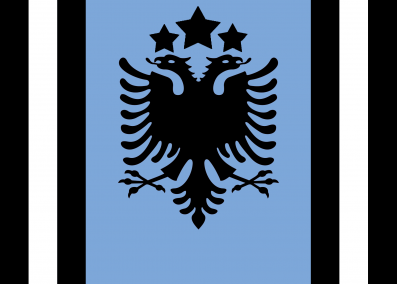Arkhangelsk
In the heart of the Kremlin, the cabinet and military leadership sat around the deep, polished and waxed wooden conference table that sat in the middle of them all. Various things sat upon it, mostly files, papers, and cups of coffee or tea. All eyes were directed towards the Premier and the Prime Minister as they discussed with the Minister of Defence in low voices.
Intelligence of the developments in Nalaya was no surprise. By virtue of the volatile and war-prone nature of the nation, the significance of the war there would not be great if not for the heavy involvement of the Shalumite military.
The matter being discussed was the feasibility and potential effectiveness of supporting and assisting the opposition to the Shalumtie and Shalumite-supported forces. The Nava'ai and the Mak'ur were the candidates, and which to support had been discussed extensively, eventually the decision of the idea of supporting the Nava'ai winning out. Both Kirova, Katin, and Avramov were well aware of the risks of supporting the Nava'ai. They knew that, compared to the Mak'ur, the Nava'ai were prone to falling apart. Allegiances disintegrating, and the various tribes of that group going to war with each other instead of the Nalayan federal government and its Protector. It was only their military prowess and warlike ways that won out, on the assumption that they'd be a more effective fighting force and cause more damage than the Mak'ur could.
The matter of arming and supplying a guerrilla army was not a light one. It would mean having to create a large network, one that could adapt and change to opening and closing supply routes, as well as extensive coordination with the Nava'ai. The supplies themselves were, thankfully, not an issue. The Soviets had been stockpiling since the beginning of the Great War, and there were entire complexes that consisted solely of stored tools of war. Rifles, ammunition, tanks, body armour. All the rest that they would be needed to supply the Nava'ai with- food and medical supplies- were likewise plentiful.
"Kharakter etoy voyny oznachayet, chto my mozhem sdelat' tak mnogo s tak malom (The nature of this war means that we can do so much with so little)," the Prime Minister could be heard saying, his deep bass voice carrying throughout the room. "Tam net prichin, chtoby ne proyti cherez eto (There is no reason to not go through with it)."
"Pri uslovii, chto net nichego voskhodit k nam (Provided that there is nothing traced back to us)," Avramov replied.
"Dazhe v takom sluchaye, chto tsalumiye ne v tom polozhenii, chtoby prinyat' mery protiv nas (Even in such an event, the Shalumites are in no position to take action against us)," Katin countered. "Vy znayete tak zhe khorosho, kak i ya, chto Holland, pri vsey svoyey rechi, uzhe potyanulsya slishkom daleko v Nalaye sprovotsirovat' nichego na granitse (You know just as well as I do that Holland, for all his talk, has stretched himself too far in Nalaya to provoke anything at the border)."
"Togda etot vopros reshen (Then it is settled)."
☭ Лояльный и непоколебимая ☭
Управление канцелярии Советской Федерации
Recipient Zhirayr Karagozian
Sender Aleksandrina Kirova, Premier of the Soviet Federation | Viktor Katin, Prime Minister
Security Priority Only - Приоритет только
Mr. Karagozian,
Though far removed physically, knowledge of the plight of your people has reached far. The pride that you and your people hold in your beliefs, in your ways and independence are admirable. It should not go unknown to you and your people that this holds you in high regard with your Soviet compatriots far north, and that as such it would be criminal to not aid you in your mission to maintain your ways, your culture, your religion, and your nation.
Nor has the military prowess and experience in warfare of your people gone unnoticed. It is these two attributes that will aid you and your people most. However, it may also be your downfall. It is only with your assurance and pledge to do all within your power to bind the Nava'ai together that we can give aid, or else we would be merely fueling infighting between various tribes.
Of the aid that can be given, both military and civil supplies can be provided. In weapons, there are scores of everything from Kalashnikov rifles to Rocket Propelled Grenades and surface to air missile launchers in storage. Armour and clothing, medical supplies and food are waiting to be shipped. Perhaps even more than material aid, and with your permission, I have been given the assurance of my Minister of Defence and Chiefs of Staff that military trainers and advisers are prepared to aid and train your people in the operation of these weapons as well as various tactics. Tactics which are designed to combat some of the heaviest of adversaries you may face, namely the Imperial Shalumite Army.
It is our belief, likewise, that Nava'ai forces on the ground would benefit from the potential deployment of military advisers as well as the deployment of more advanced anti-aircraft weaponry to combat one of the largest threats your men and women may face in the field- air power. Anti-Tank missiles will be available as well, and in the end, perhaps some direct military aid would be capable of being deployed.
We urge you to consider our offer, and are eagerly awaiting your response.
Signed,
Aleksandrina Dmitriyevna Kirova, Premier of the Soviet Federation of Acrea
Александрина Дмитрийевна Кирова
Viktor Mikhailovich Katin, Prime Minister of the Soviet Federation of Acrea
Виктор Микхаилович Катин




